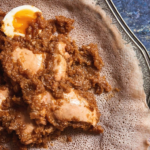Morocco, a land known for its vibrant culture and rich culinary heritage, offers a variety of flavors that captivate the senses. Among the many delightful ingredients used in Moroccan cuisine, orange blossom water and rose water hold a special place. These fragrant waters add a unique touch to dishes and beverages, infusing them with refreshing floral notes.
Orange blossom water, also known as “zhar” in Moroccan cuisine, is derived from the blossoms of the bitter orange tree. The flowers are steam-distilled to extract their essence, resulting in a clear and aromatic water. This floral water carries a distinct citrus fragrance, reminiscent of fresh oranges with delicate hints of sweetness.
In Moroccan cuisine, orange blossom water is used in both savory and sweet dishes. It adds a subtle floral essence and brightens the flavors of various dishes. It is commonly found in traditional desserts like “shebakia,” a sweet pastry made with honey and sesame seeds, and “baghrir,” a spongy semolina pancake. Orange blossom water is also a key ingredient in refreshing beverages such as “ma’amoul b’louz,” a Moroccan almond milkshake.
The versatility of orange blossom water extends beyond the culinary realm. It is often used in traditional Moroccan beauty rituals, known for its soothing and refreshing properties. The fragrant water is added to baths and facial toners, leaving a gentle floral scent on the skin and providing a calming effect.
Similarly, rose water holds a prominent position in Moroccan cuisine and culture. Derived from the petals of Damask roses, this fragrant water is made through steam distillation. The resulting liquid carries the captivating aroma of fresh roses, evoking feelings of elegance and romance.
Moroccan rose water is celebrated for its delicate and floral flavor, which enhances both sweet and savory dishes. It is frequently used in desserts such as “pastilla,” a savory-sweet pie filled with spiced meat or seafood, and “gazelle horns,” almond-filled crescent cookies. Rose water is also a common ingredient in Moroccan tea, adding a fragrant twist to the traditional mint tea.
Beyond its culinary applications, rose water is highly valued for its beauty benefits. In Moroccan skincare routines, rose water is used as a natural toner, promoting hydration and a healthy glow. Its soothing properties make it a popular choice for facial sprays and masks, adding a touch of luxury to beauty rituals.
The combination of orange blossom water and rose water in Moroccan cuisine creates a symphony of flavors and scents. These floral waters bring a refreshing and enchanting dimension to dishes, transporting the senses to the vibrant landscapes of Morocco. They infuse the culinary experience with a delicate elegance that is both intriguing and delightful.
Fortunately, orange blossom water and rose water have gained international recognition and are now available in many specialty stores and online. Embracing these flavors allows food enthusiasts around the world to recreate the enticing tastes of Moroccan cuisine in their own kitchens. Whether used in traditional Moroccan recipes or as a creative addition to favorite dishes, these floral waters offer a delightful and refreshing twist to culinary adventures.
In conclusion, Moroccan orange blossom water and rose water are treasured ingredients that bring the essence of blooming flowers into the culinary world. Their aromatic and refreshing qualities have made them beloved components of Moroccan cuisine and beauty rituals. So, embark on a sensory journey and indulge in the delightful flavors and scents of these Moroccan treasures.








